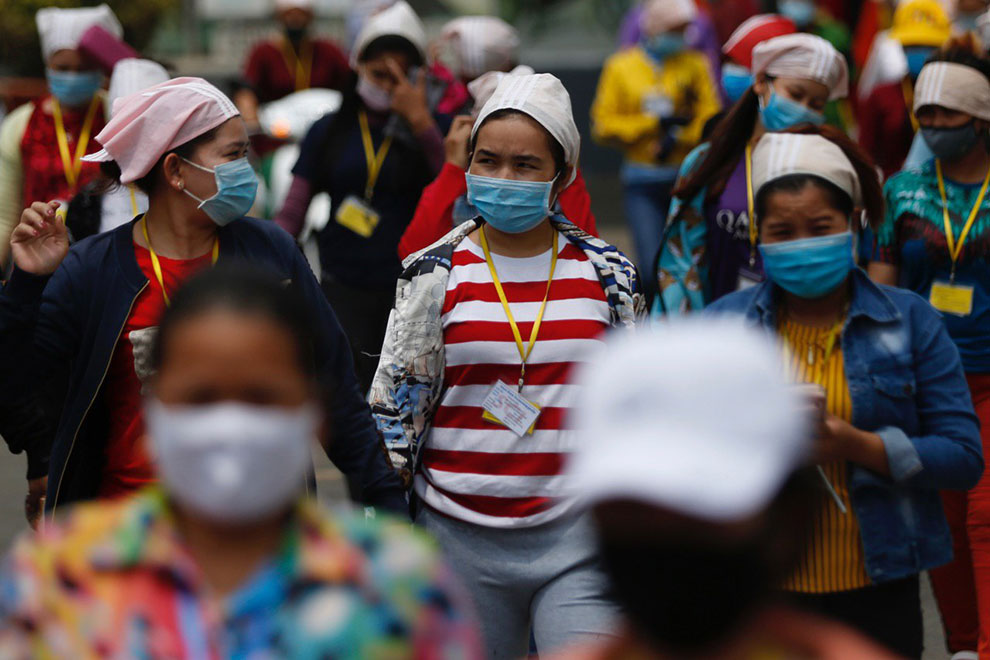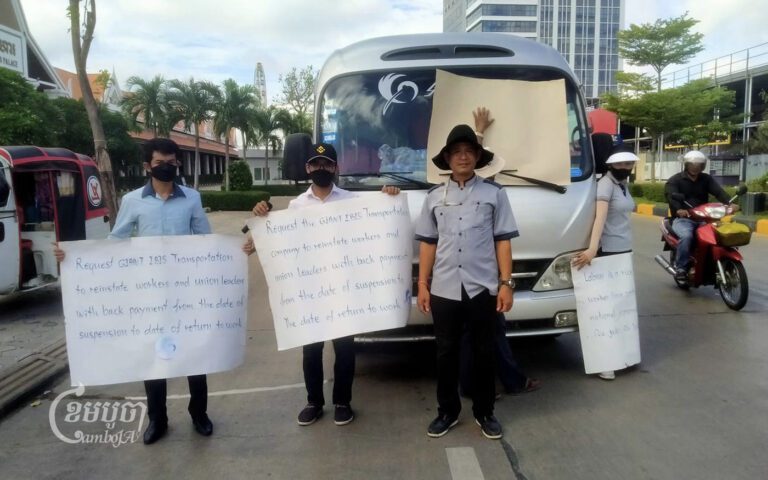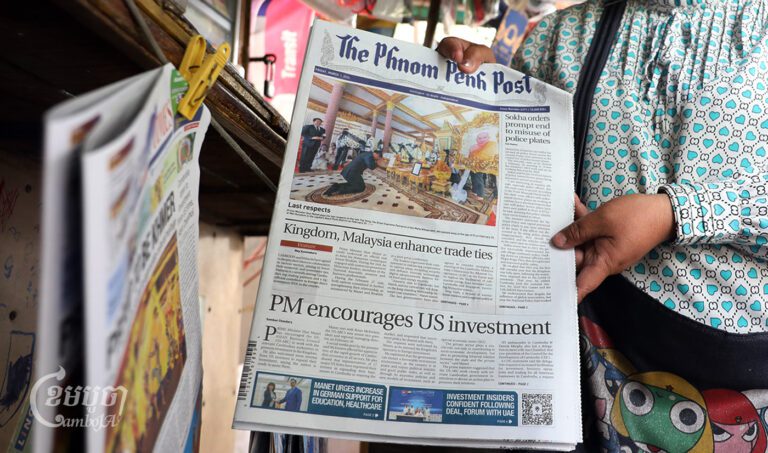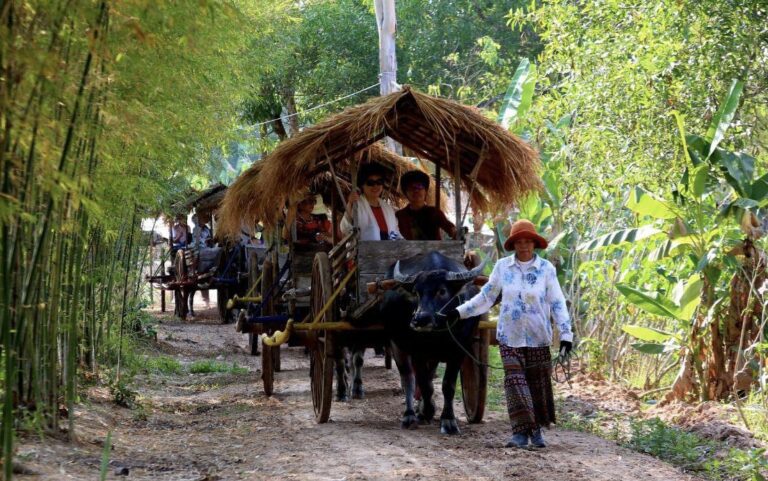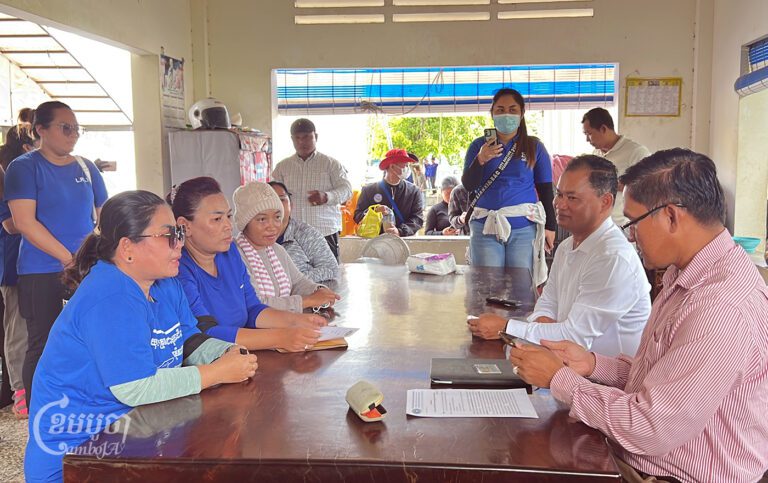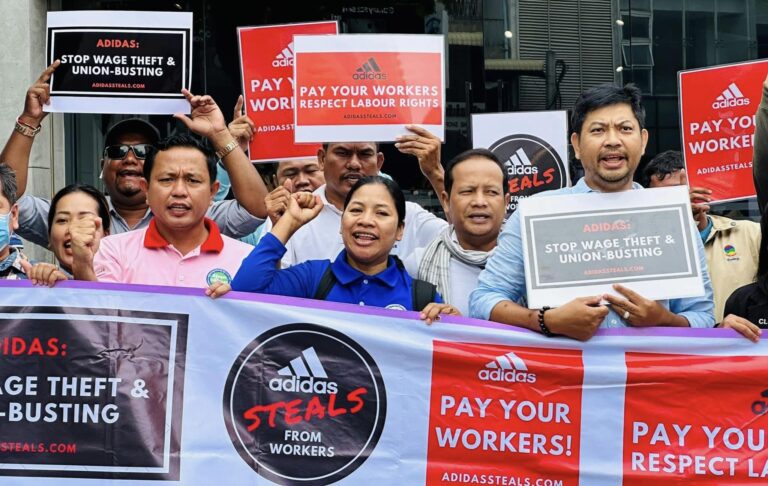Cambodia’s garment and footwear factories say they might not be able to continue paying workers even reduced wages beyond this year’s Khmer New Year, as foreign orders for clothing dry up amid the global coronavirus crisis.
Garment Manufacturers Association in Cambodia deputy secretary general Kaing Monika said that owners of factories with suspended production had complied with Prime Minister Hun Sen’s directive to continue paying workers 40 percent of the $190 monthly minimum wage but may soon struggle to stay solvent.
Under the directive, the government said it would pay the furloughed workers an additional 20 percent of the minimum wage to help mitigate a looming crisis for the hundreds of thousands employed in Cambodia’s biggest export sector.
Monika said some factory owners believed they would not even be able to cover those reduced costs after the April 13-16 break for Khmer New Year, when most Cambodians typically travel back to their hometowns for mass celebrations.
“After Khmer New Year, factory owners may face difficulties in having the ability to pay workers because of the buyers not making payments to the factories while the Covid-19 disease is spreading,” Monika said. “We are considering a request to the government to help to provide some [more] money to pay workers.”
Union leaders said they were sympathetic but also skeptical about the request.
Ath Thorn, president of Cambodian Labour Confederation (CLC) said he and other union leaders had heard about the concerns of the owners during two separate meetings with GMAC representatives and Labor Ministry officials on March 25 and April 2.
Thorn said that workers were often held to the terms of their contracts by the factory owners, and so factory owners should also be held to the terms of the contracts — including provisions on reduced salaries during times of closure.
“According to the meeting, there were six buyers — including H&M, Adidas, Inditex, VF, Mark and Spencer and Zara — that are still ordering and buying products from the garment and footwear factories in Cambodia,” Thorn said.
“The unions do not agree with GMAC as there are contracts between employees and employers, so employers must pay out the workers based on the labor law.”
Thorn said that based on the law, a factory forced to close operations for two months with in-contract workers was still required to pay 50 percent of wages. Any diversion from this was a matter for factories to work out, he said.
“If GMAC still does not agree [with following the terms of contracts], GMAC can hold a bilateral meeting with the government to talk about this issue,” he said.
Thorn said GMAC had advised him that about 100 factories planned to close.
GMAC secretary-general Ken Loo declined to be interviewed. However, GMAC issued an open letter on April 2 appealing for foreing buyers not to stop orders.
“GMAC encourages all buyers to respect the conditions of their contracts and to carry out their obligations to receive the transported goods and [make] payments for all the products which are finished as well as the products being produced,” the statement said, noting that the 750,000 garment sector jobs were at risk.
Labor Ministry spokesman Heng Sour declined to comment directly on the proposal and said only that the government was doing what it could by paying 20 percent of the monthly salaries of furloughed workers — a figure of $38.
Sour would not provide figures about the number of factories now suspended but he told Reuters last week that 91 closures had impacted 61,500 workers.
Thorn, the union leader, said those workers were receiving the 20 percent payments after travelling to attend a training course held by the government. Yet he said that many of the furloughed workers were reluctant to undertake such travel amid fears about contracting the highly infectious Covoid-19 disease.
He said most of the suspended factories were also paying out their 40 percent share, so far, but called on the government to help put in place three-month moratoriums on high-interest loan repayments to micro-finance institutions.
Among those not complying, he said, were the Dignity Knitter and Eco Base factories in Takhmao City, where more than 1,000 workers are without pay.
Phin Sophea, a representative for the Coalition of Cambodian Apparel Workers Democratic Union (CCAWDU) at the Dignity Knitter factory, said that the factory owner met with Labor Ministry officials and workers on March 17. He said they had agreed to pay workers between March 20 and 25 but had failed to do so.
The workers had divided into separate shifts to stand guard in front of the factory day and night, Sophea explained, to prevent the owners returning and taking the sewing machines and equipment inside the factories to sell without paying them.
“We want the company to pay 50 percent of the workers salaries first — and then the company can resolve our seniority and other payments,” Sophea said.
He also said the workers had not in fact received the 20 percent share from the government either. He also said that while he had heard Prime Minister Hun Sen ask Cambodia’s micro-finance institutions to defer the need for repayments while the coronavirus crisis hits factories, he was not aware of any complying.
“I did not see all those private banks and microfinance institutions follow it,” Sophea said of Hun Sen’s request. “I borrowed $1,500 to buy a motorbike, so I still need to pay microfinance nearly $100 every month for two years.”
Leng Srey, a CCAWDU factory representative at the Eco Base factory, said workers there had not been paid since January. She said workers there had also been told they would be paid for that time between March 20 and 25. They were also then promised 50-percent pay for the period after March 1 when the factory suspended operations, she said, but had also not received any of that money.
“Our workers stand guard in front of the factory every day and night because the factory owner does not resolve our salaries, seniority payments and other benefits,” Srey said. “It affects workers’ lives, such as with their rent, water and electricity bills and, especially, we have no money for microfinance repayments.”
Srey said she had worked for 14 years at the factory — across multiple changes of ownership — before the present Chinese owners disappeared without paying her. She asked Hun Sen to help find a solution for the workers soon.
“Now my life is full of difficulty because I need to pay for my rental room, for my water and electricity, and for my daily meals,” she said. “We do have any money to spend each day, and now it is getting close to Khmer New Year, too.”
Meanwhile, Song Sokuna, a garment worker at the Silver Limited Company in Tboung Khmum province for the past five years, said that the owner of her factory had told staff they would be suspending operations from April 20.
“The factory will suspend more than 300 workers among the more than 800 workers here because the factory lacks raw materials,” Sokuna said.
Sokuna worried she and the other workers would have no recourse, as the factory had consistently hired and re-hired workers only on three-month contracts to avoid legal obligations, threatening those who complained with being fired.
“We protested against the factory owner over this issue, but they just found some mistakes by the workers, including claims that workers had not done their work well, or this, or that, and so the workers felt pressure from the owners,” she said.
Sakuna said she was still working at the factory while it remained open to try to save some money, in spite of her concerns about contracting coronavirus. “They check workers’ temperature twice everyday and spray alcohol around the factory … but there is no hand sanitizer for workers to clean their hands.”
Dork Sovann, head of the women’s department at Cambodian Alliance of Trade Union (CATU), said the government should order all factories closed for a period of time to prevent Covid-19 spreading and help secure workers pay in that time.
“This is a risk for workers, so the government should issue an announcement to order all factories to be suspended for two to three months while the Covid-19 disease is spreading in the country,” Sovann said, adding there will be added risks when workers travel to and from home provinces for Khmer New Year.
Workers will travel home and intermingle with people from around the country during the holiday, she noted, and then travel back to their work sites and return to their factories, providing multiple chances for the disease to spread.
The official number of confirmed coronavirus cases in Cambodia stands at 114, with the most being recorded in Preah Sihanouk province and Phnom Penh:
| No. | City/Province | Total case | Recoverd | Deaths |
| 1 | Preah Sihanouk | 40 | 1 | 0 |
| 2 | Phnom Penh | 20 | 1 | 0 |
| 3 | Kampong Cham | 16 | 3 | 0 |
| 4 | Battambang | 8 | 2 | 0 |
| 5 | Siem Reap | 7 | 0 | 0 |
| 6 | Kep | 4 | 0 | 0 |
| 7 | Tbong Khmum | 4 | 3 | 0 |
| 8 | Banteay Meanchey | 4 | 0 | 0 |
| 9 | Kampong Chhnang | 3 | 0 | 0 |
| 10 | Kampot | 2 | 0 | 0 |
| 11 | Preah Vihear | 2 | 0 | 0 |
| 12 | Koh Kong | 2 | 1 | 0 |
| 13 | Kandal | 2 | 0 | 0 |
| Total | 114 | 53 | 0 |
The 114 cases include 49 Cambodian nationals, 40 French, 13 Malaysians, five British, two Americans, two Indonesians, one Chinese, one Canadian and one Belgian. Fifty-three among of them are recovered, the Health Ministry said.


